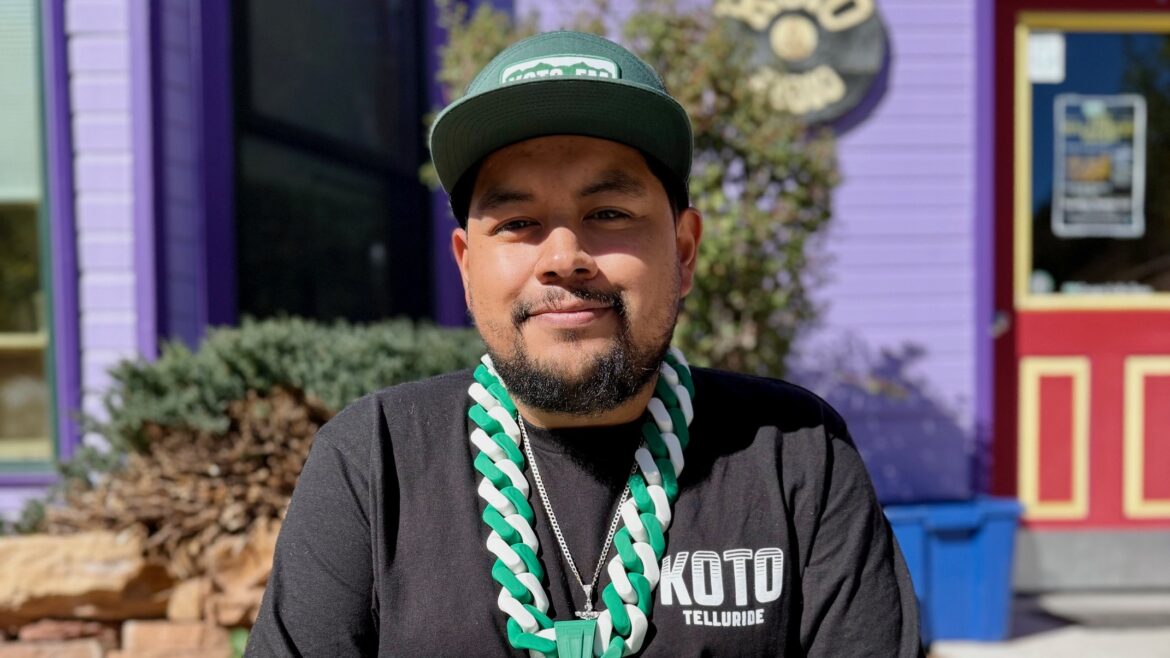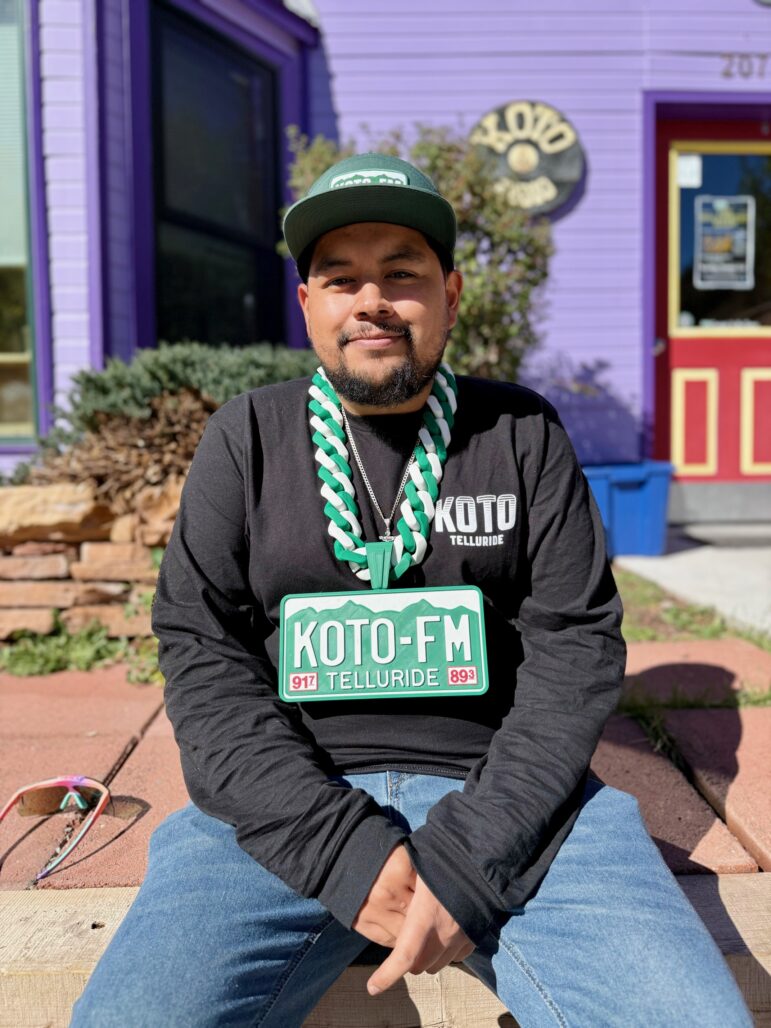How KOTO’s Luis Tavares bridges information gaps for Telluride’s Latino community

Luis Tavares
This interview originally appeared in the author’s newsletter, OIGO, and is republished here with permission.
As a vibrant tourist destination nestled in the mountains of Colorado, Telluride boasts not only breathtaking landscapes, but also a diverse community and myriad needs. It’s also an area where many people juggle multiple jobs just to afford living in an expensive place. Among those residents is Luis Tavares, who found himself stepping into an unexpected role at community radio station KOTO. With no prior experience in journalism, he became the station’s Spanish-language news reporter and Latino community outreach coordinator.

As you’ll learn, he’s driven by a passion to bridge the information gap within Telluride’s sizable Latino community.
In this conversation, Tavares shares his efforts to serve Spanish-speaking residents. He discusses the creation of his weekly Noticias, a roundup of local news and upcoming events; and his monthly live show Off the Record, where he tackles pressing issues like health, wellness and social services. Tavares has also varied his approach for hard-to-reach residents, utilizing platforms like WhatsApp to disseminate information and foster connections.
Cara Pallone, KOTO’s executive director, notes how Tavares’ commitment highlights the critical role of local media in audience engagement, and how he inspires others. “Luis has taught us and other media organizations across the state that we can do better,” she says. “His passion for inclusion has enriched the KOTO team culture and set a benchmark for everyone around him. He’s an example of how small steps can lead to meaningful change, and we’re lucky he chose to get involved with KOTO.” Professionally, I especially appreciated his view that when we help each other out and strive to get along, we can effectively address and overcome local challenges.
How did you start with KOTO?
So it was two years ago, and there were all kinds of events going on — parties here, gatherings there. Next thing I know, I’m showing up to the KOTO open house, and they’re like, “Hey, have you ever thought of this?” One thing led to another, and that’s kind of how I got started.
Now, every month, I have an Off the Record live show. On it, I’ve talked about drugs, sexual health, everything in the community. Also, on Mondays, I do my weekly report called Noticias, and it’s a roundup of things that happened during the week or are going to happen the next week. All of that stuff is available through SoundCloud.
I’ve noticed that reaching out to Spanish-speaking communities is tough — it really is. We started using WhatsApp, and we made a group where everybody that wants to learn or share can let me know. They get added, and that’s how we spread all the information.
In between times, beyond those broadcasts, it’s a lot of connecting people, being with people locally, making connections with other nonprofits.
Were you doing a lot of journalism work before then?
No, I didn’t know anything about journalism. I do now. That’s how I like to live my everyday life — learning something new.
From the beginning, I was told that I was going to be a bit of an experiment. We had never done anything like that, and the station actually learned during COVID that it’s very important to let Spanish-speaking people know what’s going on. That was what opened the door to start thinking about a Spanish news reporter, and that’s how it all came to be.
What attracted you to that role?
Getting in contact with the Latino community, which is pretty big in Telluride. We all have to work a lot to support ourselves to afford living here. The majority of the people have two to three jobs. That’s pretty standard. Even I do that, too, just to be able to support yourself. It’s a tourist town; we all depend on tourism. Places are expensive, but in Telluride even more so.
I noticed that there were events going on, and the Spanish-speaking community didn’t know what was happening. So that’s my daily focus: trying to let them know. Just the fact that people didn’t get to understand what was going on intrigued me, and I wanted to try out this work.
Now, I do a lot of collaborations with many organizations. One example, and something I’m proud of, is that a couple people went to a meeting in Denver. They met the Guatemalan consulate, and next thing you know, we’re planning to have the Guatemalan consulate come to Telluride, to the library, and help our pretty big Guatemalan community get their passports and such.
This engagement work is more than just “We’re doing a news report.” It feels like you, as an organization, have made this commitment to provide communities with information that they may be interested in finding as a public service. Was that intentional?
A word I come up with right away is “inclusion.” I believe inclusion is one of those things that doesn’t happen very often. My job is to try to make sure that the word has meaning. So, me going out there and talking to people, doing all these things — I do it because the Telluride community is very special to me personally.
Part of my day is I coordinate with a lot of people in the community. For example, a few weeks ago, there was a thing called Wellness Week. It was a couple of days with activities for the Latino community to try out. We did an Off the Record show about it, talking about everything we were doing. Even if one person is listening, I’m happy we can do that. When I had the chance to do something for the town of Telluride, I was excited to do it.
Are there particular problems that you’re working through?
One of the challenges I’ve noticed is trying to get people to be like, “Have you heard of this?” and they say, “Yeah, I’ll get to it,” but they don’t really try to be a part of it. Even trying to get people into the WhatsApp group can be difficult sometimes, and that’s something we’ve been working on. There have been a few who are like, “Hey, you need to sign me up,” and it takes two minutes, and you do it.
Another challenge I’ve had is access. I think there should sometimes be a Spanish translation so people feel welcome and like they’re part of the community, because they are. They work very hard and should be taken seriously.
Could you say more?
For example, when you go to town council [meetings], people want to learn about things that are happening, and there’s no Spanish translation available. Leaders may do it a couple of times when people go to meetings, but end it after they stop going. I kind of understand. People seem interested when they care that something gets fixed or taken care of, and they’ll stop caring when it doesn’t involve them. Stuff like that.
There’s a tendency to say, “We’ll do this a few times because people are here,” but once people have left, we don’t consider this an actual service that we provide as part of specific engagement.
Yeah, kind of. That happens in most communities; it’s not only here. It’s just something you hear from other people you talk to. In the past couple of years, it has gotten more inclusive, and I think that’s a great thing because we’re all the same — we’re all people. We might not get along, but working together, talking to people, is what’s going to fix problems.
It sounds like, in a lot of ways, your role is both a journalist and a representative for the community because, chances are, many community members could go and talk to a city leader about translations, but you as a broadcaster are going to get more attention from someone.
Yeah. For example, in those Off the Record shows, I’ve had leaders show up and talk about important issues. People can get stressed when you ask, “You want to do a little interview or a recording of this, and then we can put it on the radio, and people can hear about it?” Sometimes they get overwhelmed or scared. That’s one of the issues I have at the moment. I understand it’s a small town and everybody knows each other. But I know people listen and say, “I learned something new,” and that makes you feel good. You’re really letting people know what’s going on.
What advice would you give an organization that was looking to create a role like yours or broadcasters who want to do work like you’re doing?
I’m going to be a little blunt and say that you have to actually try. You’ve got to put the work into it. You can’t just say, “Oh, I’m trying this,” and you’re not really trying your hardest, and you don’t see movement — that’s the thing. There are times that, as I mentioned, I do have another job. I have to make sure I work in other places so I can afford living here. But sometimes at KOTO, it doesn’t even feel like I’m working because I feel like I have a responsibility now.
I would recommend people to be more inclusive with the Spanish-speaking community. There are a lot of people who speak Spanish — even not just Latinos. I feel like the language barrier shouldn’t be a problem. We all need to help each other out and learn how to get along with everybody.
I know sometimes people get weirded out when they hear different languages on the radio, but I’ve learned that even Native American people in New Mexico can speak in their native language over the radio. I don’t find that weird. I think it’s cool, and I like it.





